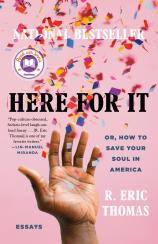Reading Group Guide
Discussion Questions
Here for It: Or, How to Save Your Soul in America: Essays

1. Which essay in the collection did you like the most, and why?
2. In HERE FOR IT, R. Eric Thomas writes, “Every story, whether truth or fiction, is an invitation to imagination, but even more so, it’s an invitation to empathy.” Do you agree? How does reading help people learn to be more empathetic?
3. One of the major themes of HERE FOR IT is belonging. Thomas writes about living at the intersections of blackness, queerness and Christianity in America. Discuss how those parts of a person’s identity can be in harmony or in conflict with each other.
4. In the essay “There’s Never Any Trouble Here in Bubbleland,” Thomas writes about his childhood and the utopia that was his progressive private school. For him, being able to grow up in a bubble of possibilities and opportunities afforded by that school was invigorating. How did this essay challenge you to think about the various bubbles people live in --- and how those are advantageous and how they are not?
5. If you are Black, queer and/or Christian, how did this book make you feel seen or represented? If you are not, how did this book help you understand some of those experiences?
6. In the essay “Unsubscribe from All That,” Thomas writes about how exhausting and toxic the internet and social media can be, especially when he relies on both to do his job. Can you relate? How does your own experience with social media affect how you engage with the rest of the world?
7. In “Historically Black,” Thomas writes, “There were moments when I was reminded that no matter how passively I engaged with my blackness, it was never not a force at work in my life. And, I found, the knowledge of my blackness could be used as a weapon against me at any moment. All my life I’d operated under the assumption that there were many kinds of blackness. But in that passing moment, during the conversation about the SATs, it occurred to me that no matter where I was, perhaps there was only one kind of black.” Discuss what he means and how America tends to homogenize Black people. How have you seen someone’s Blackness used as a weapon against them?
8. “Someone is Wrong on the Internet” is Thomas’ story about the first time he went viral for writing a satirical piece on Black History Month. How did you react to this essay? How did it make you think about accountability for what we put in a social media space?
9. “When the fact of your being is used as a weapon against you, the process of relearning who you are and what your value is, is a long one. I don’t know that I’ll ever be finished. I don’t know that I’ll ever be fully there,” Thomas writes at one point in the book. What does he mean? How are people supposed to value themselves when marginalized by the larger society?
10. In an essay about his coming-out experience, Thomas writes, “It was something else altogether. It wasn’t a collision, but an expansion. I hadn’t expected that. I felt like I was drifting toward an understanding of myself that I couldn’t comprehend.” If you are queer, how did your own coming-out experience compare? If you aren’t, how did Thomas’ story help you understand what that might feel like?
11. “And I am doing the thing that I do with things that I love, or am frustrated by, or don’t understand, or am infuriated by: I am making jokes,” Thomas writes in HERE FOR IT. How do you use humor as a tool for understanding the world or as a defense mechanism in your own life?
Here for It: Or, How to Save Your Soul in America: Essays
- Publication Date: September 7, 2021
- Genres: Essays, Humor, Memoir, Nonfiction
- Paperback: 304 pages
- Publisher: Ballantine Books
- ISBN-10: 0525621059
- ISBN-13: 9780525621058







